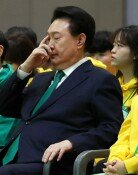[Opinion] 6-nation Dialogue
North Korea seems apparently disappointed at the results of the six-way talks held in Beijing, China last week. Pyongyang said after the dialogue that the talks were a fruitless effort and it would not participate in the follow-up talks unless the U.S. changes the hostile policy. It even went to say that the country would have to resort to nuclear deterrence as a means of protecting itself.
In July 1905, then U.S. president Franklin Roosevelt`s special envoy William Taft and Japanese Prime Minister Gatsura Daro signed the `Gatsura-Taft` pact to seal the fate of Korea. In return for its turning a blind to Japan`s invasion into Korea, the U.S. had Japan agree not to invade into the Philippines. It was a so-called big deal between the two parties. Britain and Japan formed an alliance in January 1902 against Russia, approving each other`s interests in China and Korea respectively. Then, Korea, regardless of its will to defend it won sovereignty, was annexed into Japan as a result of a series of deals.
As the World War II drew near to an end, leaders from the U.S., Britain, Russia and China met at Cairo, Yalta and Potsdam to decide the issue of surrogate ruling. As the U.S. and Russia agreed after the Japanese collapse to divide the Korean Peninsula to occupy the south and north part of the country respectively, the tragedy of Korean people began. Throughout the course, Koreans could not voice their opinions, and the fate of the country was sealed by the powers. Surrounded by world powers and unable to defend itself on its own, Korea has always been put aside while the country`s future was at stake.
This time, South and North Korea sat face-to-face with four world powers. Compared to what happened a century and a half century ago and the 1954 Geneva Talks when world powers discussed the future of Indochina and Korea, this is the first time that Koreans are involved in discussions for their future. There seems to be a long and tough road ahead to resolution of North Korea nuclear program. North Korea might have mentioned its withdrawal from any further talks to gain an upper hand in discussions. But we should not leave our fate at the hands of foreign powers again. This time, we must be concerned parties in the process. To do so, North Korea must make a decision for peace.
Ahn In-hae, Guest Writer, Professor at Korea Graduate School of International Studies, yhahn@korea.ac.kr
Headline News
- Harris ‘first female president’ vs. Trump ‘again 2016’
- N. Korea builds 11-meter rampart after road demolition
- Democratic Party eventually agrees to abolish financial investment income tax
- Drug smuggling is seized twice a day on average this year
- Surrounded by ‘uniforms,’ NHL’s first female coach ‘time-out’







